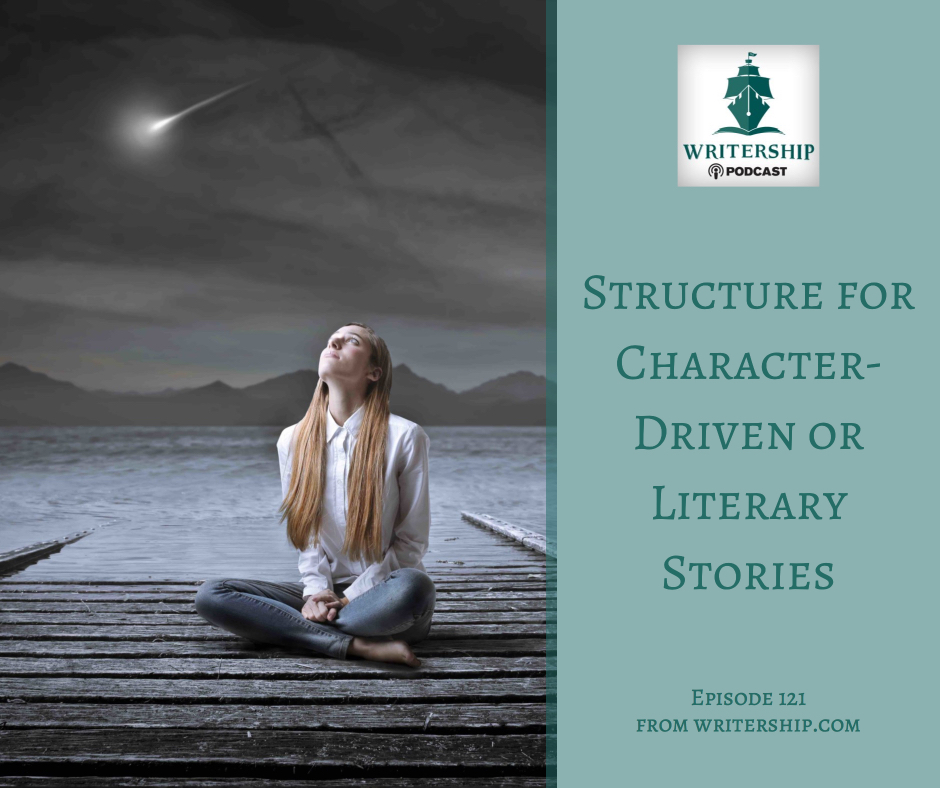Ep. 121: Structure for Character-Driven or Literary Stories
Description
In this episode, fiction editors Leslie Watts and Rachelle Ramirez critique “How I Stumbled into the Golden Cage,” a short story by Jose Arroyo. They discuss genre and how stories that emphasize the protagonist’s inner journey still need structure.
Writers of literary stories can use the steps in the Kubler-Ross grief process to plan and revise the structure of their stories and may find it’s a better fit than other systems suited to more active stories. Even if you’ve written a thriller or an action story, you can use the Kubler-Ross steps to follow your protagonist’s inner journey alongside whatever structure you use for the external events of the story.
One challenge writers face with character-driven stories is how to demonstrate the inner shifts the character experiences without over-relying on thoughts and telling. Leslie and Rachelle talk about ways to dramatize internal events to evoke certain emotions in your reader.
This week’s editorial mission encourages you to use the Kubler-Ross steps to check your protagonist’s internal journey and be sure the important events are present and adequately dramatized.
<figure class="
sqs-block-image-figure
intrinsic
">

</figure>
Listen to the Writership Podcast
This week's submission contains some adult language.
About Our Guest Host
<figure class="
sqs-block-image-figure
intrinsic
">

</figure>
Clark is taking a well-deserved break from the podcast, so today we're joined by Rachelle Ramirez, a Certified Story Grid Editor.
Rachelle has edited award winning fiction and assisted memoir writers in dramatizing their stories for the page. She is the author of the forthcoming novel White Grrrl, Black Sheep, and is currently working on a Story Grid Guide to Memoirs of a Geisha.
You can find out more about Rachelle here.
Wise Words on The Character-driven stories
<figure>
“Since serious literature is less prone to “big” events than commercial fiction is, it is actually more in need of a well-constructed plot than anything Jackie Collins ever dreamed of. In literary fiction the plot must be far more layered, intricate, and finely woven in order to illuminate subtler and more nuanced themes. Character-driven novels rely a lot less on sinking ships, falling meteors, and tidal waves, and a lot more on a missed gesture, a quick nod, a moment’s hesitation—which in the hands of a great writer can feel more earth shattering than a nine-point earthquake. But make no mistake: literary fiction still revolves around an escalating series of challenges that the protagonist must brave, because no matter how keenly honed the protagonist, he still has to want something real bad.”
<figcaption class="source">— Lisa Cron, Wired for Story: The Writer's Guide to Using Brain Science to Hook Readers from the Very First Sentence </figcaption>
</figure>
Mentioned on the Show
This week’s submission is narrated by C. Steven Manley, the author of the Paragons Trilogy, the Brace Cordova Space Opera series, and host of the Story Shots Podcast. You can find out more about him here.
We’re experimenting with this feature, so please let us know what you think!
Synopsis for this week's submission
Pepe is laid off from his job as an air conditioning installer, and though he chooses to see it as an opportunity to pursue his writing, he struggles, but when his unemployment benefits are cut off, he must decide whether to give up his dream of being a writer or take a job that offers him no fulfillment to support himself and his children.
Extra resources
Hooked by Les Edgerton has great advice for dramatizing story openings.
Wired for Story: The Writer's Guide to Using Brain Science to Hook Readers from the Very First Sentence by Lisa Cron provides information and advice for crafting fiction that meets your reader’s expectations.


Kübler Ross's stages of grief
<figure class="
sqs-block-image-figure
intrinsic
">

</figure>
The Writership Index
Listeners have asked for an index of the podcast episodes and the topics discussed, so we've put together a Google spreadsheet containing details of each episode, its airdate, author name, story title, genre, story type, published location, author website, and topics discussed. Get access to the spreadsheet here.
Join the Writership Book Club!
Join the Writership Quarter Masters Book Club! Each month I'll choose a book from your suggestions. We'll read it and, together in a (virtual) book club meeting, analyze it the way I would for a Story Grid Diagnostic.
In December we're tackling crime stories. For more information, visit our Patreon page.
Editorial Mission—Showing Internal Change with External Actions
Look at the internal change that your protagonist goes through, and test it against the Kubler-Ross stages of grief or (change metabolism).
Shock
Denial
Anger
Bargain
Depression
Deliberation
Choice
Integration (Or not)
If anything is missing or is revealed, ask yourself how you dramatize this externally.
<form action="https://lesliewattseditor.activehosted.com/proc.php" class="_form _form_5 _inline-form _inline-style _dark" id="_form_5_" method="POST">
<input name="u" type="hidden" value="5" />
<input name="f" type="hidden" value="5" />
<input name="s" type="hidden" />
<input name="c" type="hidden" value="0" />
<input name="m" type="hidden" value="0" />
<input name="act" type="hidden" value="sub" />
<input name="v" type="hidden" value="2" />
Do you want editorial missions sent directly to your inbox?
Sign up to join us aboard the Writership Podcast! We'll send new episodes and editorial missions directly to your inbox so you'll never mis





